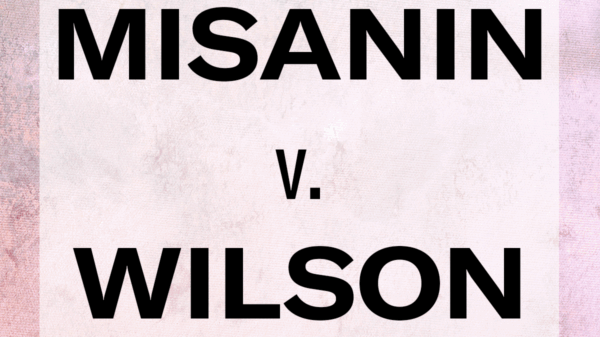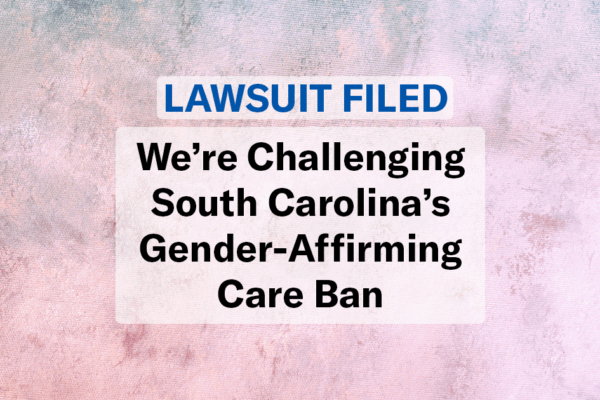CHARLESTON, S.C. – Transgender South Carolinians and their families are suing the state of South Carolina to block enforcement of a ban on gender-affirming healthcare. They are represented by attorneys from the American Civil Liberties Union, ACLU of South Carolina, and Selendy Gay.
House Bill 4624, signed into law by Governor Henry McMaster on May 21, prohibits doctors from providing potentially lifesaving care for transgender youth as well as many transgender adults. The law restricts access to “gender transition procedures,” including evidence-based treatments like puberty delaying medications and hormone therapy that are recommended for treatment of gender dysphoria by the leading medical associations.
- A prohibition on medical professionals providing gender-affirming care to South Carolinians under age 18;
- A prohibition on the use of public funds for gender-affirming care for South Carolinians regardless of age; and
- A prohibition on gender-affirming care coverage under South Carolina’s Medicaid program
The plaintiffs in the case include two parents and their minor children who would be denied gender-affirming care when the law’s total ban takes effect Jan. 31, 2025, along with three adults whose healthcare has been disrupted by the law. Most of the plaintiffs are filing anonymously to protect their privacy. The named plaintiff in the case, Sterling Misanin, is a 32-year-old transgender man whose scheduled surgery was abruptly canceled at the Medical University of South Carolina after the law passed.
“I feel so lucky and fortunate to be supported and affirmed by so many wonderful people who accept me for who I am,” said plaintiff Sterling Misanin of Charleston, South Carolina. “My family continues to be extremely supportive of me living as the man that I am. In Charleston, I have a wonderful community who make me feel safe and seen. But the actions by MUSC have caused me significant harm, and I am devastated that my state has interfered in my access to life-saving health care. I am an adult, and I know myself better than my state does, and I cannot stay silent about the very real harms that this law inflicts on transgender people like me.”
“A law that takes away healthcare from people, that strips away the ability of parents to make medical decisions for their children, that criminalizes doctors who follow the established standards of care isn’t just mean-spirited and harmful – it’s also unconstitutional,” said Jace Woodrum, Executive Director of the ACLU of South Carolina. “Transgender South Carolinians should be able to get the medical care they need without politicians coming into their doctors’ offices with them. That’s why we’re challenging this dangerous law.”
“The lives, health, and wellbeing of transgender South Carolinians are at stake with the passing of this unconstitutional law, and we stand ready to vindicate their right to be free from discrimination because of who they are. This law will inflict harm on South Carolinian families by denying transgender youth medically necessary treatment that has been proven effective and safe, and its public funding restriction further endangers South Carolina’s transgender PEBA and Medicaid beneficiaries, including transgender adults who cannot otherwise afford this life-saving care,” said Sruti Swaminathan, staff attorney with the ACLU’s LGBTQ & HIV Project.
“This bill, one of many similar pieces of anti-LQBTQ+ legislation across the country, is part of a concerted effort to deprive people of medical care,” said Julie Singer, an attorney at Selendy Gay. “The law prevents equal treatment under the law, and it takes away parents’ fundamental right to make life-saving decisions for their children. Selendy Gay is proud to stand with the ACLU in this fight against discrimination in South Carolina and the attempt to limit access to healthcare.”
South Carolina’s gender-affirming care ban is already having devastating effects on transgender South Carolinians and their families. While some parents of trans children are making plans to flee the Palmetto State to protect their children’s health and safety, others without the resources to move to a free state are living in fear of what will happen to their loved ones when the state intervenes in their treatment. When left untreated, gender dysphoria can cause severe harm, including anxiety, depression, and suicidality.
The law sets a dangerous double standard for medical care that is clearly discriminatory against transgender individuals. For example, while the state now prohibits puberty-delaying medication for adolescents with gender dysphoria, it allows the prescription of the same medications to treat central precocious puberty. While hormone therapy is now prohibited for many transgender people, the same treatment is allowed for patients with Turner’s Syndrome and polycystic ovarian syndrome.
The plaintiffs in the lawsuit argue that H. 4624 violates the Equal Protection Clause of the 14th Amendment because it discriminates against transgender individuals on the basis of sex and transgender status. The plaintiffs also argue that the law violates the due-process rights of parents and the anti-discrimination clauses of the Medicaid Act, Affordable Care Act, Americans with Disabilities Act, and Rehabilitation Act.
H. 4624 passed during a wave of anti-LGBTQ legislation in statehouses across the country. During the same legislative session, South Carolina lawmakers introduced 22 other bills targeting transgender people. But similar laws in other states have already started to fall under legal scrutiny, particularly in the Fourth Circuit Court of Appeals, which includes South Carolina.
In April 2024 in the case Kadel v. Folwell, the Fourth Circuit ended North Carolina’s discriminatory exclusion of coverage for gender-affirming healthcare via the state employees’ insurance plan. The same Fourth Circuit opinion also ended West Virginia’s exclusion of gender-affirming care for low-income transgender people enrolled in Medicaid.
Related Content

Misanin v. Wilson
Stay Informed
Sign up to be the first to hear about how to take action.
By completing this form, I agree to receive occasional emails per the terms of the ACLU’s privacy statement.
By completing this form, I agree to receive occasional emails per the terms of the ACLU’s privacy statement.

